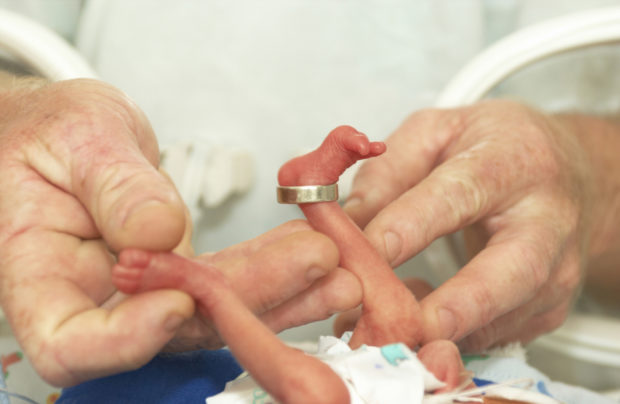One in seven babies born with low birthweight, says study

A fathers wedding ring is placed on the foot of his new baby. Image: iStock/PaulBroben via AFP
More than 20 million newborns in 2015 came into the world weighing too little, according to a global assessment of birthweight, published Thursday, May 16.
Researchers in the Lancet Global Health reported that over 90% of babies tipping the scale at less than 2.5 kilograms (5.5 pounds) when born were in low and middle-income countries.
Worldwide, just under 15% of 2015 newborns in 148 countries canvassed had low birthweight, varying between 2.4% in Sweden and nearly 28% in Bangladesh.
That’s down from a global average of 17.5% in 2000.
But meeting the World Health Organization target of cutting low birthweight 30% between 2012 and 2025 “will require more than doubling the pace of progress,” said lead author Hannah Blencowe, a professor at the London School of Hygiene & Tropical Medicine.
In sub-Saharan Africa, the number of low birthweight live births actually increased from 2000 to 2015, from 4.4 to 5 million.
Southern Asia is estimated to have had 9.8 million in 2015, nearly half the world total.
Weighing less than 2.5 kilograms at birth is closely linked to high rates of neonatal mortality and ill health later in life. More than 80% of the world’s 2.5 newborns who die every year are low birthweight.
Underweight newborns who survive also have a greater risk of stunting as well as developmental and health problems, including diabetes and cardiovascular disease.
“National governments are doing too little to reduce low birthweight,” Blencowe stated.
Undernourished mothers
To meet the global nutrition target of a 30% reduction by 2025 will require more than doubling the pace of progress.
The reasons for low birthweight are very different in poor and rich regions.
In South Asia and parts of sub-Saharan Africa, a large percentage of underweight babies are born at term but are stunted because their mothers were undernourished.
In North America and Europe, a higher share of low birthweight babies are preemies.
Adolescent pregnancies, a high prevalence of infection, high levels of fertility treatment, and a high rate of cesarean sections, especially in the United States and Brazil can all be factors, the study found.
An international team of researchers analyzed national government databases to estimate the prevalence of low birthweight in 148 nations from 2000 to 2015.
Overall, the study took into account 281 million births. Several countries, including India, were not included for lack of data.
“Every newborn must be weighed, yet worldwide we don’t have a record for the birthweight of nearly one-third of all newborns,” said co-author Julia Krasevec, a statistics and monitoring specialist at UNICEF.
Besides Sweden, other countries with relatively few low birthweight babies included Finland (4.1%), Iceland (4.2%) Serbia (4.5%), Norway (4.5%), Albania (4.6%), China (5%), Croatia (5.1%) and Cuba (5.3%).
Many large advanced economies fell in the 6% to 8% range, including France, United States, Great Britain, Germany, Mexico and Brazil.
Five countries, including Bangladesh, had low birthweight rates above 20 percent such as Comoros, Guinea-Bissau, Nepal and the Philippines. HM/JB
RELATED STORIES:
Overweight mothers have larger babies—study
Older dads’ kids run higher health risks at birth — study